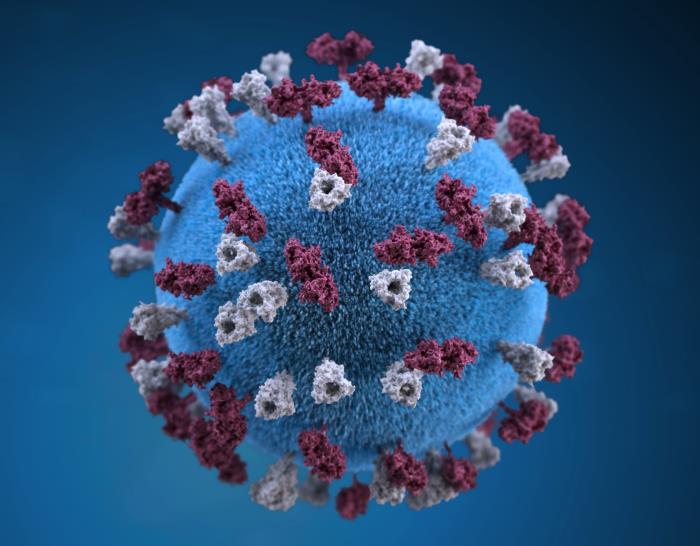Merck & Co. will partner with Themis Bioscience to develop vaccine candidates based on Themis’ measles virus vector-based platform, through the Austrian biotech’s first-ever collaboration with a major biopharma.
Themis says the platform, which it licenses from the Institut Pasteur in Paris, can incorporate large recombinant genes coding for selected antigens into its genome. Vaccines developed through the platform are designed to deliver multiple selected antigens—such as full-length proteins or virus-like particles—directly to macrophages and dendritic cells, thus triggering a specific immune response to the selected antigens.
The companies have committed to developing vaccine candidates against an undisclosed disease target. Speaking with GEN, Themis CEO Erich Tauber, MD, would not disclose what indications the companies are focusing on.
“What I can say is the measles virus vector technology allows to exploit infectious diseases and cancer indications, and when it comes to infectious diseases, we use the measles virus to bring our specific antigens into the body. Those might be difficult to express in normal cell systems,” Tauber said.
“Another advantage is we can use exactly the same manufacturing process for each new vaccine target. And when it comes to cancer, the measles virus itself has strong oncolytic activity,” Tauber said, such as mediating tumor cell lysis, T cell activation, and specific tumor cell targeting. “The measles virus can kill cancer cells. And we enhance this activity by putting in specific therapy enhancing proteins like immune modulators.”
Merck has agreed to make an unspecified equity investment in Vienna-based Themis under the companies’ collaboration and exclusive license agreement, which Themis said could generate for it more than $200 million.
In addition to the equity investment, Merck agreed to provide Themis an unspecified amount of research funding, as well as up to approximately $200 million in payments tied to achieving development and sales milestones, plus royalties on approved products from the collaboration.
“We continue to evaluate technologies with the potential to deliver novel vaccine candidates,” Daria Hazuda, PhD, CSO, Exploratory Science Center and vp of infectious diseases and vaccine discovery at Merck, said in a statement. “We look forward to collaborating with the scientists at Themis.”
Surging vaccines sales
Merck credits human vaccines, along with cancer treatments led by the blockbuster immunotherapy Keytruda® (pembrolizumab), with its most recent positive quarterly results.
During the second quarter, Merck said, overall company sales rose 12% year-over-year to $11.760 billion—or 15% excluding the effect of foreign exchange rates. The biopharma giant finished Q2 with $2.670 in GAAP net income, up 56% from $1.707 billion in the second quarter of 2018.
However, human health vaccines sales zoomed 33% year-over-year, to $2.0 billion, or 36% when excluding currency impacts. Two vaccines led Merck’s sales surge: PROQUAD (Measles, Mumps, Rubella and Varicella Virus Vaccine Live) and VARIVAX (Varicella Virus Vaccine Live), a vaccine to help prevent chickenpox, saw their combined sales jump 58% in Q2, to $675 million from $426 million in the year-ago quarter. Merck cited higher demand, including from private-sector buyers, and U.S. pricing, as well as government tenders in Latin America and higher demand in Europe.
Merck also reported a 46% quarterly sales jump (50% excluding currency impacts)—to $886 million from $608 million in Q2 2018—for the tandem of GARDASIL [Human Papillomavirus Quadrivalent (Types 6, 11, 16, and 18) Vaccine, Recombinant] and GARDASIL 9, vaccines indicated to treat some cancers and other diseases caused by HPV. Merck cited primarily public sector buying patterns, U.S. demand and pricing, and the ongoing commercial launch in China, as well as higher demand in Europe, driven primarily by increased vaccination rates for both boys and girls.
Expanding pipeline range
Merck’s collaboration with Themis is likely to expand the range of indications for vaccine candidates in the pipeline of Themis, which has focused most in developing vaccines against infectious diseases, but also has several preclinical immuno-oncology programs.
In October 2018, Themis signed an exclusive worldwide license agreement of undisclosed value with Max-Planck-Innovation GmbH, the technology transfer agency of the Max Planck Society, to develop, manufacture, and commercialize therapies based on an oncolytic measles virus platform jointly developed by the Eberhard-Karls-University Tübingen and the Max Planck Institute for Biochemistry.
Themis’ most advanced pipeline program is an unpartnered chikungunya vaccine candidate MV-CHIK, which Tauber said remains on track for a Phase III trial set to begin later this year. The pivotal multi-center trial will test a single-shot regimen, with patients to be dosed at centers in Europe, the U.S., and the Americas.
In June, Themis was awarded up to $21 million in non-dilutive capital toward development of the chikungunya vaccine by the Coalition for Epidemic Preparedness Innovations (CEPI), part of CEPI’s third call for proposals with support from the European Union’s (EU’s) Horizon 2020 research funding program under grant agreement No. 857934. The award is intended to accelerate regulatory approval of the chikungunya vaccine and ensure that at-risk populations have access to the vaccine by funding a “significant” portion of the capital needed for the Phase III trial, Themis said at the time.
Themis once planned to fund the Phase III trial through an up-to-€55.3 million ($61.3 million) initial public offering on Euronext Amsterdam, but postponed the IPO in November 2018, citing adverse market conditions.
The chikungunya candidate is also under study in a Phase II trial (NCT03807843) designed to assess the vaccine’s safety and immunogenicity in adults with a history of chikungunya infection; and another Phase II trial (NCT03635086) designed to investigate the immunogenicity, safety, and tolerability of MV-CHIK as well as the long-term durability of anti-chikungunya antibody response after administration of different dose levels of the vaccine in three different formulations.
Last year, CEPI awarded Themis up to $37.5 million toward developing vaccines for Lassa fever and Middle East respiratory syndrome (MERS).


